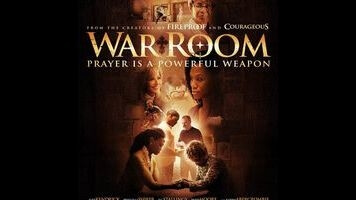What Elizabeth apparently needs is a quiet space where she can ask God to help her husband stop being a work-obsessed jerk; the responsibility for that change is on her, via The Lord when asked properly. Clara operates out of an empty closet with hand-written goals and scriptural citations taped to the wall, to help her plan and execute her prayers, so Elizabeth follows her example, resulting in an unprecedented number of shots of people staring at closets in awe. (The other regularly recurring feature: jokes about how much Elizabeth’s feet smell.) Her first prayer monologue is fiery enough—culminating with her standing on the porch, telling Satan to back off without apparent regard for what the neighbors might think of somebody yelling into the suburban night air about the devil. But much of what follows is turgid and, for non-believers, ridiculous, a series of religious homilies that are both oddly specific and totally vague about the larger theology underpinning the prayer-warrior concept, presuming (correctly) that the target audience is already familiar with it.
Because of its specific focus, War Room doesn’t have the scattershot polemic agenda of fundamentalist beliefs to affirm that many other faith-based films do. The secondary emphases are on the importance of wifely submission in the midst of marital difficulty, the unthinkability of divorce, the desirability of children addressing their father as “sir” and—in an aside establishing Clara as a nice, proper lady —that it’s a shame so many young people these days have “sloppy hair and pants around their knees.” The film is predictably shameless about cloaking itself in virtue, setting Clara’s list of answered prayers next to a photo of MLK on her wall. The Kendricks are almost certainly sincere (if their request for warriors to pray for them throughout production is any indication), as is their cast; Shirer is a ministry founder, the daughter of a pastor, a public speaker, and religious writer who has a book coming out tied in to the film.
To be fair, the Kendricks are technically semi-competent, favoring basic handheld close-ups of people talking through lengthy scenes. There’s the occasionally bewildering editorial effect: Elizabeth’s first prayer is covered from a camera to her left and one head-on, intercutting between the two angles with no evident relation to the monologue’s internal momentum. At least the film allows its characters to not be on-message about God all the time and even has room for people who aren’t required to proclaim their faith (or be berated for their lack thereof). Still, it’s structurally listless and unimaginative, including a typical guys-talking-on-the-basketball-court of the type definitively skewered in They Came Together.
It’s innocuous enough fare, though it’s creepy to encourage women to believe the true source of their husbandly woes is Satan rather than an issue that probably needs to be discussed. Clara’s climactic monologue—oddly and unintentionally reminiscent of the people-come-together climax of Tomorrowland—exhorts us to be a nation of warriors, showing demographically balanced multi-cultural groups of people praying at the flagpole, in a police station locker room, and in front of a map nailed to the wall somewhere or other. This includes a pointed shot of the White House, which is as political as the film gets. Nonetheless, it’s unnerving that the cast is so into their product that, in a recent promotional interview, Stallings said he thought the film was a potential cure for the recent, especially prominent wave of racial tension in the wake of shootings, police brutality, etc. “Racial tension is dangerous and people are dying and a lot of us want to see that stopped,” he explained. “This movie will give people a way to take these problems to the Lord and show them that prayer is the best way to fight back.” Simply put: That’s not helpful.


 Keep scrolling for more great stories from A.V. Club.
Keep scrolling for more great stories from A.V. Club.